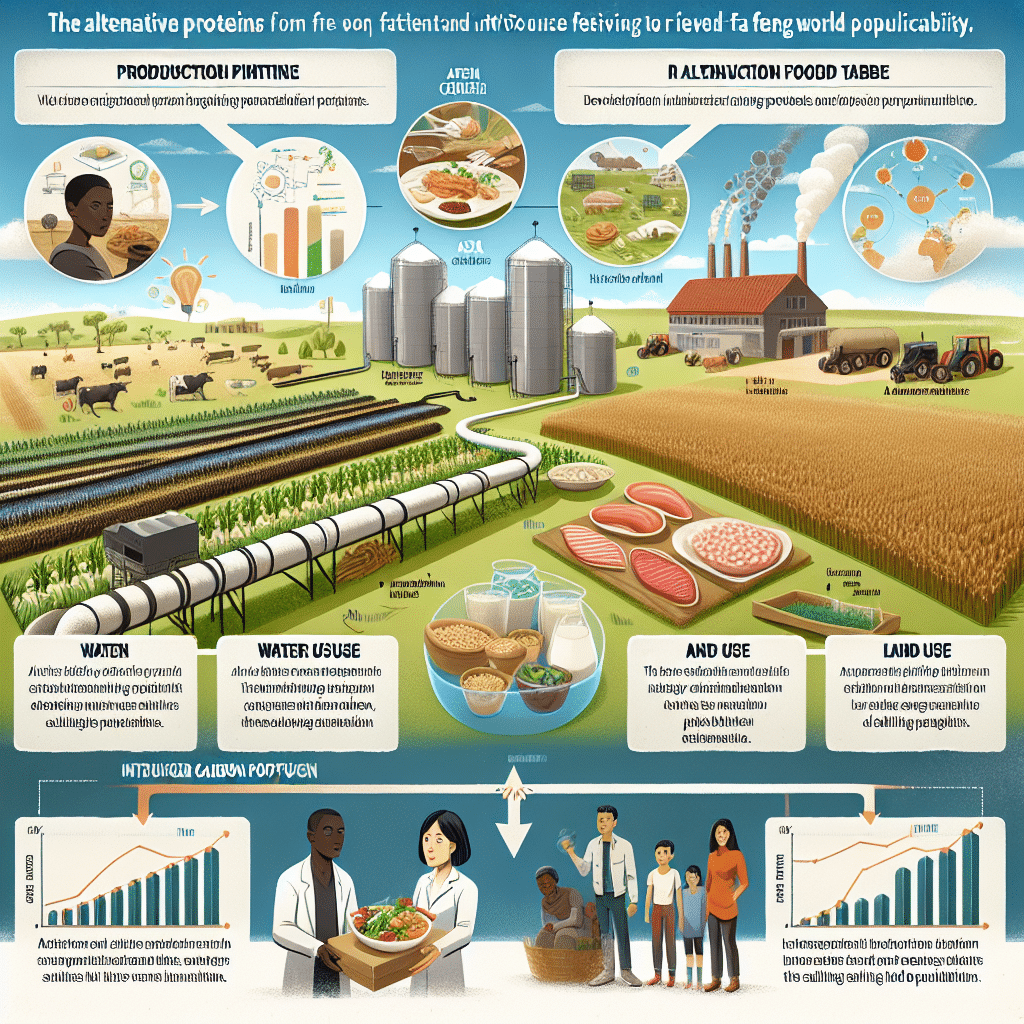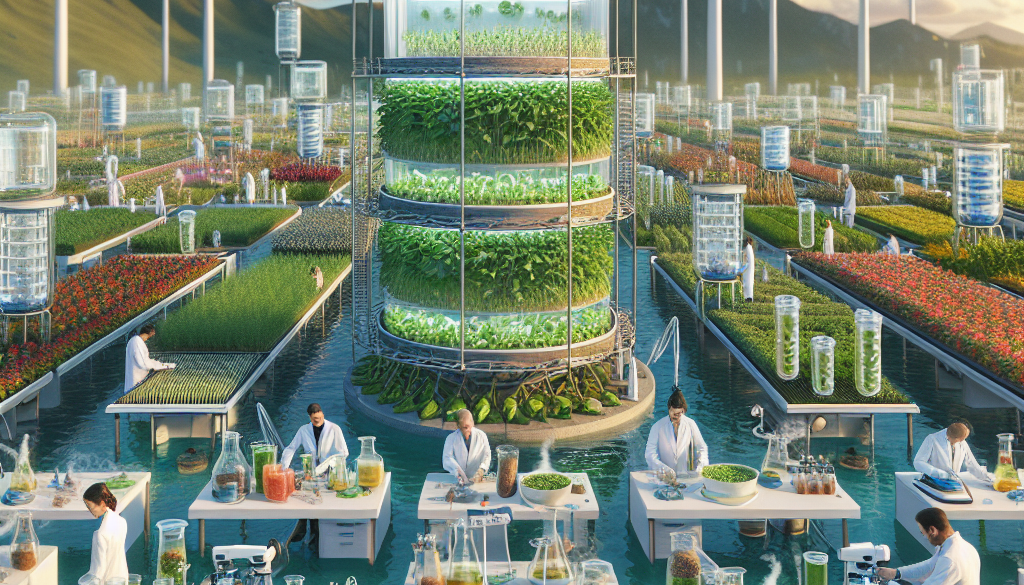Shaping Food Production and Sustainability with Alternative Proteins
-
Table of Contents
- Alternative Proteins: Pioneering Sustainable Food Production
- The Rise of Alternative Proteins
- Environmental Benefits of Alternative Proteins
- Nutritional Advantages of Alternative Proteins
- Challenges in Scaling Alternative Proteins
- Innovations in Alternative Protein Sources
- Case Studies: Success Stories in Alternative Proteins
- Conclusion: The Future of Food is Protein Diverse
- ETprotein: Your Partner in Alternative Protein Solutions
Alternative Proteins: Pioneering Sustainable Food Production

The global food system is at a crossroads. With the world’s population projected to reach nearly 10 billion by 2050, the demand for food, particularly protein, is set to soar. Traditional animal-based protein sources are increasingly unsustainable due to their significant environmental footprint, including high greenhouse gas emissions, land and water usage, and biodiversity loss. This has led to a surge in interest and investment in alternative proteins, which promise to reshape food production and contribute to a more sustainable future.
The Rise of Alternative Proteins
Alternative proteins are derived from plant-based, microbial, or cell-cultured sources. They are designed to replicate the taste, texture, and nutritional profile of animal proteins while offering a more eco-friendly production process. The market for alternative proteins has witnessed exponential growth, with the plant-based protein sector alone expected to reach $14.5 billion by 2025.
Environmental Benefits of Alternative Proteins
Switching to alternative proteins can significantly reduce the environmental impact of food production. Here are some key benefits:
- Reduced Greenhouse Gas Emissions: Plant-based proteins generate considerably fewer greenhouse gases compared to livestock.
- Lower Land and Water Usage: Producing alternative proteins typically requires less land and water than raising animals for meat.
- Biodiversity Preservation: Alternative protein production can help alleviate the pressure on natural habitats, reducing deforestation and species extinction.
Nutritional Advantages of Alternative Proteins
Alternative proteins are not just environmentally friendly; they also offer nutritional benefits:
- High-Quality Protein: Many alternative protein sources provide essential amino acids similar to those found in animal proteins.
- Lower in Saturated Fats: Plant-based proteins typically contain less saturated fat, which is beneficial for heart health.
- Additional Nutrients: Alternative proteins can be rich in fiber, vitamins, and minerals, contributing to a balanced diet.
Challenges in Scaling Alternative Proteins
Despite the promise of alternative proteins, there are challenges to overcome:
- Scaling Production: Scaling up production to meet global demand while maintaining quality and affordability is a significant hurdle.
- Consumer Acceptance: Shifting consumer preferences and overcoming skepticism about taste and texture is crucial for widespread adoption.
- Regulatory Hurdles: Navigating the complex regulatory landscape for novel food products can delay market entry.
Innovations in Alternative Protein Sources
Several innovative alternative protein sources are gaining traction:
- Plant-Based Proteins: Soy, pea, and rice proteins are popular plant-based options that are already widely used in products like meat substitutes and protein powders.
- Microbial Proteins: Proteins derived from fungi, algae, and bacteria offer a sustainable and efficient production process.
- Cell-Cultured Meats: Meat grown from animal cells in bioreactors is an emerging field that could revolutionize the meat industry.
Case Studies: Success Stories in Alternative Proteins
Several companies have made significant strides in the alternative protein market:
- Beyond Meat and Impossible Foods: These companies have popularized plant-based meat alternatives that closely mimic the taste and texture of beef.
- Quorn: A pioneer in mycoprotein-based products, Quorn uses a fermentation process to produce a meat substitute from fungi.
- Memphis Meats: As a leader in cell-cultured meat, Memphis Meats is working towards bringing lab-grown meat to consumers.
Conclusion: The Future of Food is Protein Diverse
The shift towards alternative proteins is not just a trend; it’s a necessary evolution of our food system to meet the demands of a growing population while mitigating environmental impact. By embracing alternative proteins, we can pave the way for a more sustainable, resilient, and nutritious food supply. The key to success lies in innovation, consumer education, and supportive policies that encourage the development and adoption of these groundbreaking food sources.
ETprotein: Your Partner in Alternative Protein Solutions
If you’re looking to incorporate high-quality alternative proteins into your products, ETprotein is your ideal partner. With a diverse range of organic bulk vegan proteins and L-(+)-Ergothioneine, ETprotein offers solutions that are not only sustainable but also cater to the health-conscious consumer. Their non-GMO, allergen-free proteins are perfect for various applications, from sports nutrition to health and wellness products.
ETprotein’s commitment to quality and customer satisfaction makes them a trusted supplier for leading global brands. By choosing ETprotein, you’re not only getting superior protein products but also supporting a more sustainable food system.
About ETprotein:
ETprotein, a reputable protein and L-(+)-Ergothioneine (EGT) Chinese factory manufacturer and supplier, is renowned for producing, stocking, exporting, and delivering the highest quality organic bulk vegan proteins and L-(+)-Ergothioneine. They include Organic rice protein, clear rice protein, pea protein, clear pea protein, watermelon seed protein, pumpkin seed protein, sunflower seed protein, mung bean protein, peanut protein, and L-(+)-Ergothioneine EGT Pharmaceutical grade, L-(+)-Ergothioneine EGT food grade, L-(+)-Ergothioneine EGT cosmetic grade, L-(+)-Ergothioneine EGT reference grade and L-(+)-Ergothioneine EGT standard. Their offerings, characterized by a neutral taste, non-GMO, allergen-free attributes, with L-(+)-Ergothioneine purity over 98%, 99%, cater to a diverse range of industries. They serve nutraceutical, pharmaceutical, cosmeceutical, veterinary, as well as food and beverage finished product distributors, traders, and manufacturers across Europe, USA, Canada, Australia, Thailand, Japan, Korea, Brazil, and Chile, among others.
ETprotein specialization includes exporting and delivering tailor-made protein powder and finished nutritional supplements. Their extensive product range covers sectors like Food and Beverage, Sports Nutrition, Weight Management, Dietary Supplements, Health and Wellness Products, and Infant Formula, ensuring comprehensive solutions to meet all your protein needs.
As a trusted company by leading global food and beverage brands and Fortune 500 companies, ETprotein reinforces China’s reputation in the global arena. For more information or to sample their products, please contact them and email sales(at)ETprotein.com today.












